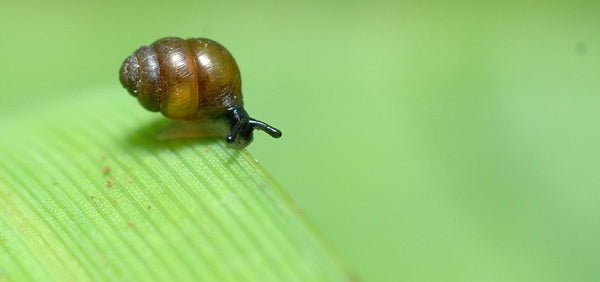Pond Snails
 Are Snails a positive thing for a pond?
Are Snails a positive thing for a pond?
One of the creatures that you are certain to encounter when having a pond is the snail. Pondkeepers are divided on whether these are a good or a bad thing for ponds. Snails used to be celebrated for algae and Blanketweed control; but this role has been taken over by UV bulbs in filters.
Often, snails will get access to your pond without encouragement. They may hitchhike on turtles, pets or on new plants. They may even travel into your pond from a neighbour’s pond, nearby rivers or wetlands. It’s impossible to stop snails getting into your pond.
So. Are snails a good thing to have or a bad thing?

Positives
The snails will continue to eat a wide variety of waste in your pond. For example, the snails can control the algae in your pond; keeping green water and Blanketweed at bay; they will also feed on the sludge and other organic matter in your pond, maintaining the nutrients in your pond and keeping it cleaner and tidier.
Having a lot of snails in your pond can also be a sign that the water quality is poor; so, you will need to get the water tested to see if there are any underlying problems that your pond is facing. You can test the water using either Blagdon's Pond Health Test Kit or Tetra's Pond Test 6-in-1.

Negatives
While the snails will consume algae and other organic matter in your pond, they also enjoy nibbling on healthy plants, including Lilies. This may put off a Pondkeeper from encouraging snails, as a Lily can be the centrepiece in a pond.
Snails also have a habit of reproducing very quickly, although this is not normally a problem as the snails will vacate the pond. But this still means your pond may become overpopulated with the snails; increasing the likelihood that they will eat your plants. As the snail population grows, they may even harm the nutrients in your pond; causing spikes in Ammonia, Nitrites and Nitrates.
Wild snails can also host various parasites; this may pass on to your fish and cause your fish to suffer or increase fish deaths. But this particular problem can be reduced by purchasing your snails from a local garden centre; just don’t go looking for wild snails.

How to remove snails
If you do not want snails in your pond, there are a few easy methods to remove them. Firstly, they can be manually removed when you see them moving around your pond; either remove the snail by hand, with a pond vacuum or a catching net. Snails can be coerced into one location by leaving lettuce leaf at the side of your pond; though this may attract snails that were not native to your pond.
Secondly, you can also introduce natural predators to your pond; like frogs or ‘assassin snails’. Assassin snails are snails which eat snails smaller than themselves, although they could proliferate and cause the same problems in your pond.
Conclusion: Should you get snails for your pond?
It’s a really tough question to answer, as there are benefits and complications from having snails in your pond.
If you have a very large pond (50,000+ litres), then having snails in your pond is an inevitability and they can actually help your filtration. If you have a small pond (under 20,000 litres), then it is less likely that you need to go out and buy snails.
If you need any further assistance, please contact us.